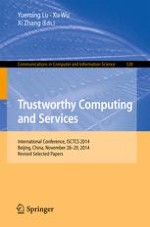2015 | OriginalPaper | Buchkapitel
Software Vulnerability Severity Evaluation Based on Economic Losses
verfasst von : Yunxue Yang, Shuyuan Jin, Xiaowei He
Erschienen in: Trustworthy Computing and Services
Verlag: Springer Berlin Heidelberg
Aktivieren Sie unsere intelligente Suche, um passende Fachinhalte oder Patente zu finden.
Wählen Sie Textabschnitte aus um mit Künstlicher Intelligenz passenden Patente zu finden. powered by
Markieren Sie Textabschnitte, um KI-gestützt weitere passende Inhalte zu finden. powered by
